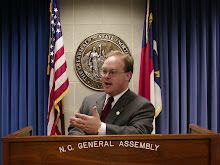
July 6, 2007
Dear North Carolina Democrat:
Now that the 2007 congressional district conventions have been held and resolutions passed by those districts have been referred to me and the NCDP Platform and Resolutions Committee, we are now at the time when two vital things occur:
(1) The Platform and Resolutions Committee schedules its work session in advance of the August 25th State Executive Committee meeting in Greensboro; and,
(2) As chairman of the Platform and Resolutions Committee, I announce the schedule of Regional Town Hall Meetings. These regional meetings are opportunities for Democrats to gather together to discuss, comment on, and recommend resolutions that were either passed by one or more district conventions, submitted by an NCDP auxiliary group (whether official or unofficial), submitted by the public at large, submitted by the Resolutions Committee, or submitted by the NCDP chairman.
Do note two additional items. First, because there is no State Convention in odd-numbered years and we adopted a thorough Platform last July, this year we will only consider resolutions. No amendments to the Platform will be considered until 2008 in advance of the State Convention. (This is not to be confused with any proposed amendments to the Plan of Organization, which arise through a separate process and committee.) Second, because we only address resolutions this year, then we are able to start a little later with our regional town meetings than in previous years.
These meetings have been quite successful and productive in the recent past. In 2005 and 2006 more than 300 persons each year participated in the meetings all across the State. We also received hundreds of resolutions and proposed Platform amendments, all indicative of a vibrant Party membership resolute in taking a stand and in taking action on matters of interest to them. I have been very pleased with how inclusive and more efficient we have been with the process during these two years. It has also been pleasing to note that our Democratic legislators, State officials, and Congressional leaders have received the adopted resolutions and Platform as well. This is a vast improvement over years past. We have more improvements to make but the key to success lies with you.
Accordingly, the work session of the full Platform and Resolutions Committee is hereby set for 6 p.m., Thurs., August 9 at NC Democratic Party HQ in Raleigh. Attendance is open to the public, as always. We will allow for participation by conference call and email as needed.
As for the schedule of the Regional Town Hall Meetings themselves, the dates and locations are:
July 16
RaleighWake Co. Democratic Party
NC Dem. HQ, 220 Hillsborough St
6:30 pm
Contact: Jan, 919-828-5656 admin@wakedems.org
July 25
Winston-SalemForsyth Co. Democratic Party
Southside Library, 3185 Buchanan Street
6:30 pm
Contact: Fred, 336-391-2381 fterry@triad.rr.com
July 26
AshevilleBuncombe Co. Dem. Party
Buncombe Co. Dem. HQ, 951 Fairview Road
6 pm
Contact: Kathy, 828-645-0906, hq@buncombedems.org
tandem9@charter.net
July 30
CharlotteMecklenburg Co. Dem. Party
TBD (one of the libraries), Location to be determined by July 12
6:30 pm
Contact: David, 704-579-2006 erdman@charlotte-nc-law.com
July 31
FayettevilleCumberland Co. Dem. Party
Cumberland Co. HQ Library,
Pate Room, 300 Maiden Lane
6 pm
Contact: Roberta, 910-484-7936 RWADDLE@nc.rr.com
Aug 1
New BernCraven Co. Dem. Party
Golden Corral Buffet & Grill Restaurant
400 Hotel Dr (near Hwy 70 and U.S. 17)
6 pm
Contact: Rachel, rparnell43@suddenlink.net
Aug 2
GreenvillePitt Co. Dem. Party
Sheppard Memorial Library, Conf. Rm B
530 Evans Street
6:30 pm
Contact: Johnny, 252-321-7743 rousejohnny@hotmail.com
Aug 7
WindsorBertie Co. Dem. Party
Bertie Co. Courthouse
Courthouse Square, downtown Windsor
6:30 pm
Contact: Penny, 252-794-2968 dgtptt@earthlink.com
Aug 8
DurhamDurham Co. Dem. Party
Durham Co. Public Library, SW branch
near Orange Co. line; 3605 Shannon Rd.,
http://www.durhamcountylibrary.org/locations/s.php
7 pm
Contact: Kevin, 919-416-0445 kmf@nc.rr.com
Aug 9
RaleighNCDP PLAT. & RESOLUTIONS COMM.
NCDP HQ, 220 Hillsborough St.
6:30 pm
Contact: Wayne, 910-997-1301 gwaynegoodwin@gmail.com
Note: At the time of this printing we were still trying to select the best date for the
Wilmington regional town meeting. If there is sufficient interest, we may schedule one in Lexington. Furthermore, you will note that one site is still to be determined (TBD), as we await further input from the county or regional party leaders. Regardless, we are “locked in” on the dates. Watch your email and the NCDP website for updates. Feel free to contact me as well as indicated below.
Please pass the word to members of your respective county Party membership, especially precinct chairs and officers. We would like to equal or exceed attendance this year as we prepare for the August 25th State Executive Committee meeting where we will act on the work done by the Platform and Resolutions Committee. If you have any questions or concerns or resolution suggestions, then please feel free to email me at gwaynegoodwin@gmail.com or call me at (910) 997-1301, or you may fax me via the NCDP at (919) 821-4778 (remember to put my name on the fax). For your convenience I have also enclosed a copy of the material on how to construct a resolution, as found in the NCDP County Chairs Handbook.
In closing,
let us recall that resolutions are how we as Democrats collectively express ourselves on issues of the day – whether they concern our Nation, our State, or our own local community. They are ways to educate and inspire; more importantly, resolutions are calls to action.Thank you for your dedicated service to the North Carolina Democratic Party, and answering this call to action!
With warmest personal regards, I am
Very truly yours,
WAYNE GOODWIN
Chairman, Platform and Resolutions CommitteeEnclosure



